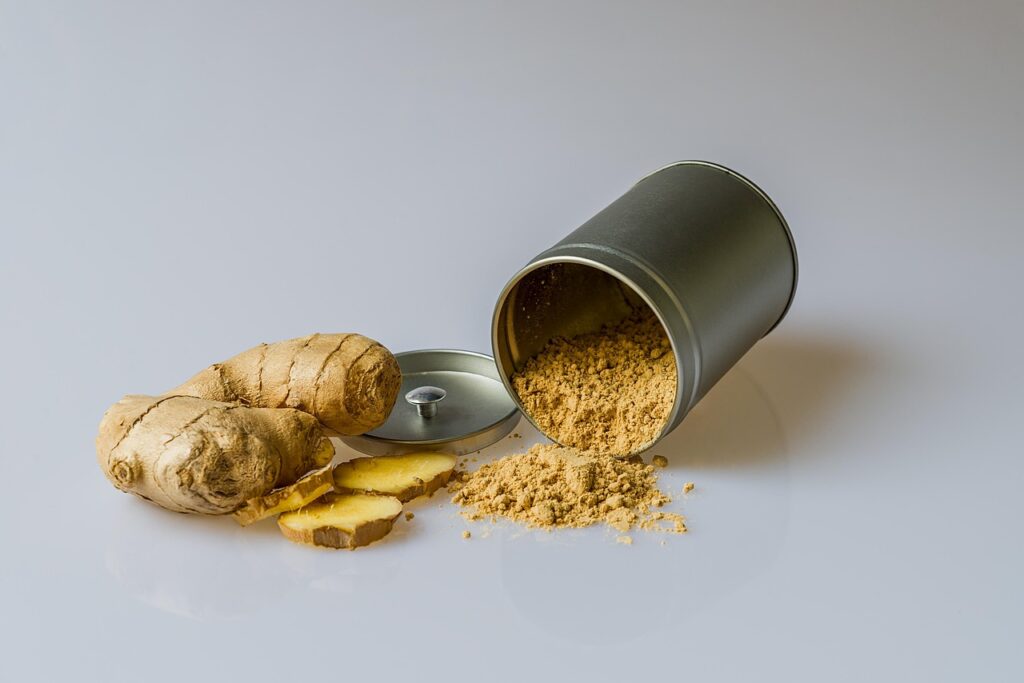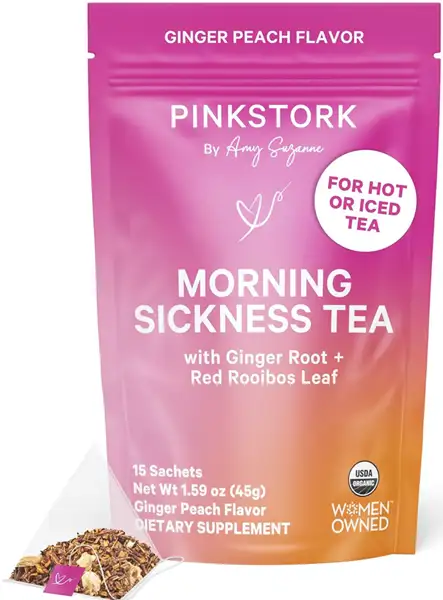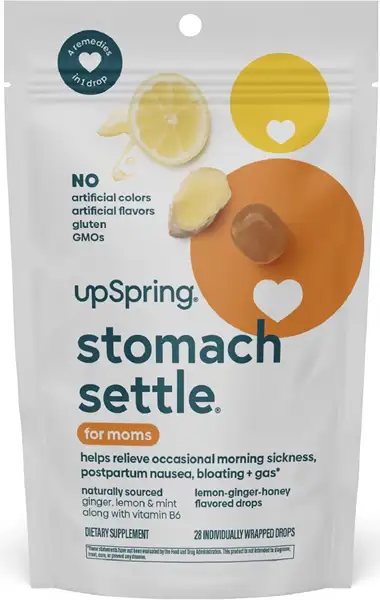Last updated on July 17, 2025
If you’re dealing with morning sickness, you’ve probably heard someone recommend ginger. Whether it’s in tea, candy, or capsule form, ginger is one of the most talked-about natural remedies during pregnancy. But is ginger safe in pregnancy?

Let’s break down what the research says, how much ginger is safe, and the best ways to use it to relieve pregnancy nausea.
Is Ginger Safe in Pregnancy?
Yes, ginger is generally considered safe during pregnancy, especially when used in moderation to help manage nausea.
Numerous clinical studies have shown that ginger is more effective than a placebo in relieving pregnancy-related nausea and vomiting, particularly during the first trimester. Trusted medical sources, such as the American College of Obstetricians and Gynecologists (ACOG) and the World Health Organization (WHO), also recognize ginger as a natural option for managing mild nausea and vomiting during pregnancy.
Ginger for Morning Sickness: Does It Really Work?
Absolutely. Ginger is one of the most well-studied natural options for easing pregnancy nausea. It works by helping to calm the stomach and reduce the feeling of queasiness.
If you’re experiencing that familiar wave of nausea from simply brushing your teeth or smelling dinner, ginger might be worth trying. Ginger root contains compounds like gingerol and shogaol that help settle the stomach and reduce nausea-related signals to the brain.
Common forms of ginger for morning sickness:
- Ginger candies (look for ones made with real ginger root)
- Ginger tea (homemade or bagged)
- Ginger capsules (standardized for consistent dosing)
- Ginger ale (check labels for actual ginger content—not just flavoring)
I used ginger myself during both of my pregnancies. For me, ginger tea in the morning and a ginger candy in my purse were lifesavers during those rough first-trimester weeks. While it didn’t completely eliminate nausea, it definitely took the edge off, without needing to jump straight to prescription meds.

One of my personal favorites was the Pink Stork Organic Morning Sickness Pregnancy Tea. I especially loved drinking it cold, like an iced tea—it was refreshing and soothing on my queasy stomach. The blend contains organic ginger and other pregnancy-safe herbs that work together to gently ease nausea.
Alongside the Pink Stork tea, I often made a simple homemade ginger tea. You can find the recipe below.

Another product I kept nearby was UpSpring Stomach Settle Drops for Moms. These little ginger candies also include spearmint and lemon, which helped calm my stomach between meals or when I was on the go.
Homemade Ginger Tea
You can drink it warm or chill it in the fridge and pour it over ice for a refreshing iced version.
Here’s how I made it:
- Add 1 teaspoon (about 5 grams) of sliced or grated fresh ginger root to a cup of hot water.
- Let it steep for 10 to 15 minutes.
- Strain, then sip slowly.
- Add honey or lemon if you like a touch of flavor.
How Much Ginger Is Safe in Pregnancy?
When it comes to how much ginger in pregnancy is safe, most studies and experts agree that up to 1,000 mg (1 gram) of ginger per day is considered both safe and effective for relieving nausea.
A key clinical trial published in the American Journal of Obstetrics and Gynecology found that pregnant women taking 1,000 mg of ginger daily for four days experienced significantly reduced nausea and vomiting compared to a placebo, with no increase in adverse effects (Pongrojpaw et al., 2001, PubMed).
That equals about:
- 1 teaspoon of freshly grated ginger root, or
- Four cups of weak ginger tea brewed with a total of 1 teaspoon of grated ginger
Always start small to see how your body reacts. And if you’re using a supplement, make sure the dosage is clearly labeled and doesn’t exceed the 1,000 mg daily limit.
Ginger Capsules and Supplements in Pregnancy
If you’re not a fan of ginger’s strong taste, you can try ginger capsules or other ginger supplements. Just make sure to look for high-quality ginger supplements specifically designed for pregnancy, and consult your healthcare provider before starting any new supplement.
Another benefit of supplements is that they offer accurate, standardized dosing, which is helpful if you’re tracking intake closely.
💡 Important: Avoid mega-doses or highly concentrated extracts unless directed by your doctor. Stick to the 1,000 mg/day guideline.
Pros & Cons of Ginger Supplement in Pregnancy:
Pros
- Easy to take
- No strong ginger taste
- Standardized dose
Cons
- Risk of overuse if not dosed properly
- Not all supplements are created equal—some may contain additives or non-pregnancy-safe ingredients
Ginger Side Effects in Pregnancy
While ginger is generally safe, too much of a good thing can still cause problems. Some women may experience:
- Heartburn
- Gas or bloating
- Upset stomach at higher doses
There’s also some concern that excessive use of concentrated ginger supplements could increase bleeding risk or affect circulation, so moderation is key.
💡 Note: Fresh ginger (grated or in tea) is unlikely to cause side effects unless consumed in very large amounts.
Ginger Benefits for Pregnant Women Beyond Nausea
Ginger is more than just a nausea remedy. It also offers several other benefits during pregnancy:
- Natural antioxidant support
- It may help reduce inflammation
- Aids digestion and eases bloating
- Relieves sore throat and mild coughs
FAQs about Ginger in Pregnancy
Final Thoughts: Is Ginger Safe in Pregnancy?
If you’re wondering whether ginger is safe during pregnancy, the answer is yes, as long as it’s used in moderation. From ginger tea to capsules, this root has proven to be a gentle and effective way to ease morning sickness and other early pregnancy discomforts.
Always talk with your provider before starting any new remedy, especially supplements. Your healthcare provider can provide personalized advice based on your health and pregnancy. But for most moms-to-be, ginger is a safe, natural way to feel just a little bit more like yourself.
Disclaimer: This article is for informational purposes only and does not replace medical advice. Always talk to your healthcare provider before starting any supplements during pregnancy.

